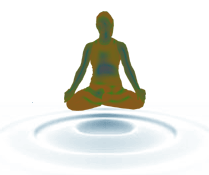“Yoga begins with listening. When we listen we create space.” So states Richard Freeman in his CD set, The Yoga Matrix. As an example, when we listen to a good friend, we give her space to be whoever she needs to be in this moment. We don’t begin to think of our response or interrupt. We fully listen. We are fully present and aware of her.
Recall that space, akasha, is the most subtle of the five elements in the Samkhya cosmology. And the sense associated with space is listening, which implies that it is the most subtle sense. There exist complete meditative practices that focus solely on listening as the technique; the anchor is sound. With practice, we can learn to discriminate minute details in all the sounds around us. We drop any judgments that this is a nice sound, or an annoying sound. Meditation centers are often very noisy places; there are lots of sounds to work with. Or we can go on retreat to a very quiet part of nature, but even here, there will be lots to hear.

Listening can be done anywhere, and at any time. Like our breath, our ability to listen is always with us. During our Yin Yoga practice we have lots of time, and many chances to practice this form of mindfulness. Settle into your pose, and then listen. Hear the sounds close to you. Notice the sounds far away; notice the brightness, the tone, the pace, and timbre of each sound. Notice your reaction to the sound; do not attempt to stop these reactions. At first you may find you don’t like certain types of sounds: the music in the background may seem distracting; the teacher’s voice or the breathing of another student close by may get on your nerves. Just notice these emotions, and let them be. Return to simply listening.
When your practice has ended, notice if your ability to really listen stays with you as you prepare for your next activity. Remind yourself to come back to simply listening throughout the day. When we listen, thoughts tend to recede or stop. We naturally pause when we are in input mode. We are open to noticing whatever there is to be noticed. Erich Schiffmann suggests buying a digital watch with a count down timer. Set it to chime every twenty minutes, and each time it chimes, pause – listen – just for a moment, drop whatever activity your mind is engaged in, and come back to this moment with full awareness. Listening is a very quick and effective way to regain this moment. [1]
- — A very nice program you can download onto your computer is a bell that sounds throughout your day, reminding you to come back to the present moment. You can find this program at the Washington Mindfulness Community Web site: www.mindfulnessdc.org/bell.
(Next: Red Lights and Telephones )
